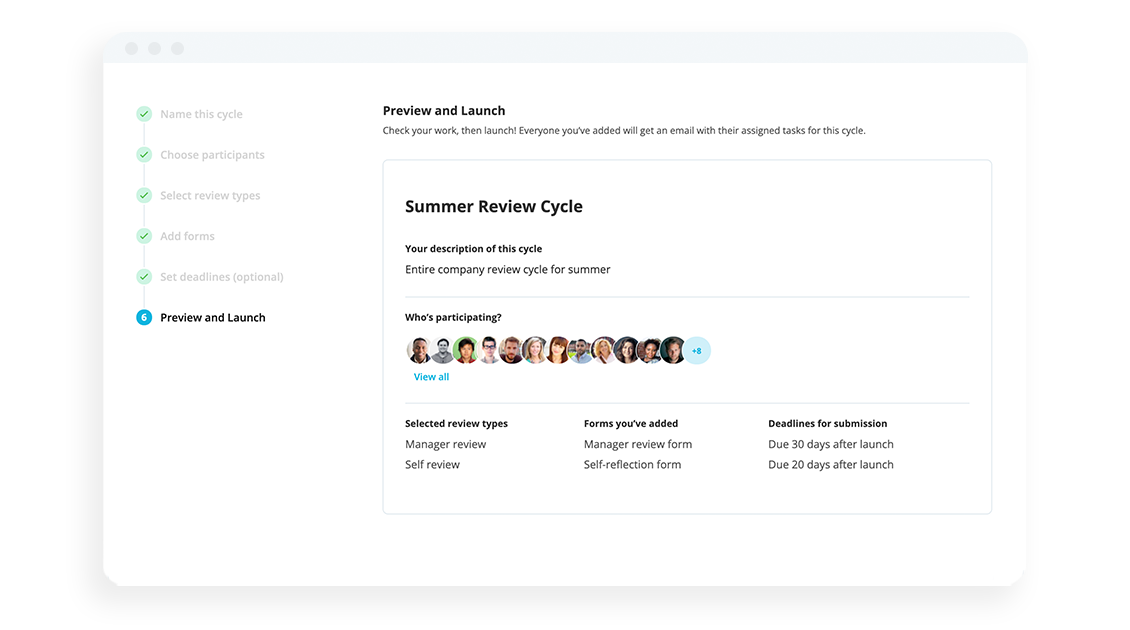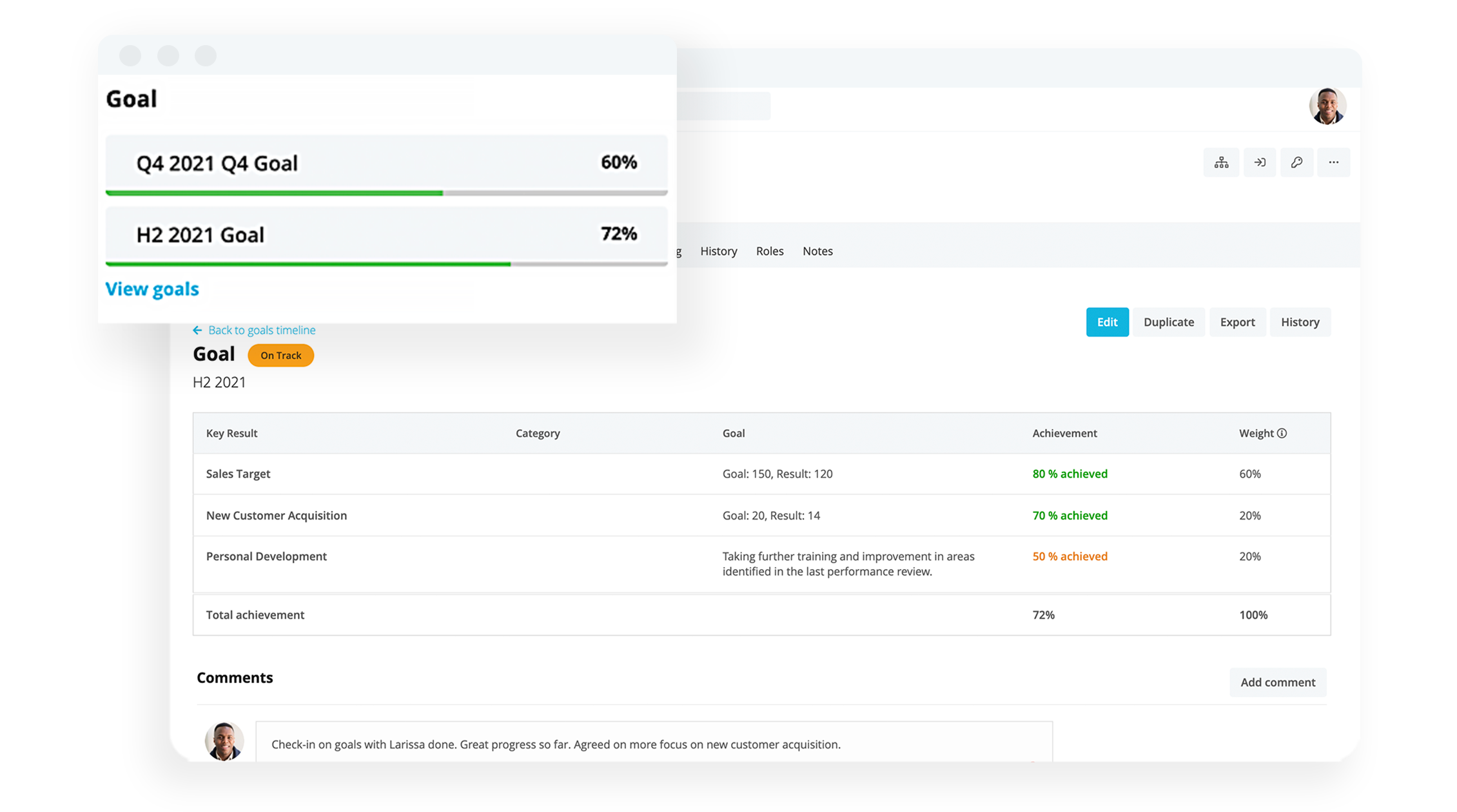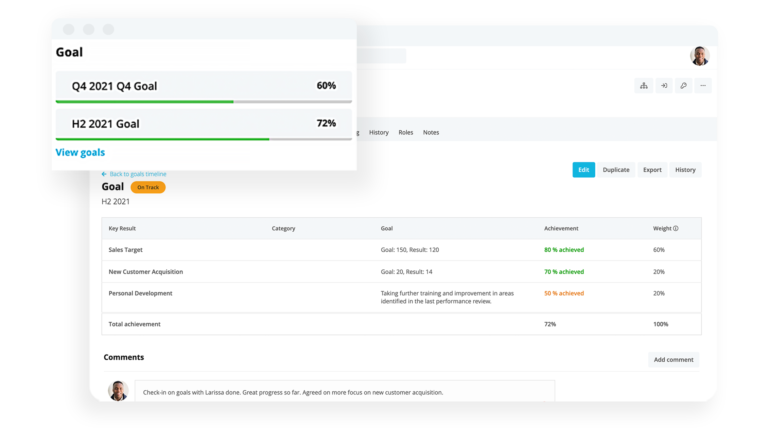Christmas Bonuses & Top Employee Bonus Schemes

For many employees, a Christmas bonus is a happy conclusion to a long year of hard work. But, for employers, the question of paying employee bonuses is still worth considering.
What is an employee bonus? When are they required to be paid? And how does paying a Christmas bonus (or other annual bonus) benefit your business?
This article is here to give HR leaders all the information they need when considering the impact of rewarding employees at the end of the year, or other times.
Keep track of goals, and easily link them to payments, using Personio.Contents
- 1What Is An Employee Bonus?
- 2Should You Have An Employee Bonus Scheme In Place?
- 3Are There Different Types of Bonuses?
- 4How Common Are Christmas Bonuses?
- 5Do Employers Legally Have To Provide Christmas Bonuses?
- 6How Do You Properly Communicate Not Giving Out Bonuses?
- 7How Does An Employee Bonus Contribute To Corporate Culture?
- 8Bonuses Are Great, But Clear Communication Is Greater
What Is An Employee Bonus?
An employee bonus is a reward given by the company to the employee for achieving certain goals. These are often variable, and can be based on an employee's performance, a company’s performance, or a combination of these two elements.
Is A Bonus The Same As An Incentive?
An employee incentive is anything that’s offered to incentivize an employee to reach a certain goal. While this is usually a cash payment of a specific size, it’s not the same as a bonus.
Although the term ‘employee bonus’ is often used interchangeably with the term ‘incentive,’ they’re not actually the same thing.
Employee incentives are usually offered to influence future behaviour. Bonuses can be used in the same way – but they can also be used to reward employees for great behaviour in the past.
Ultimately, bonuses can be discretionary or non-discretionary.
What’s The Difference Between A Discretionary And A Non-Discretionary Bonus?
A discretionary bonus is given at the sole discretion of the employer. This means an employee can’t expect them to provide one. There’s no requirement for the employer to provide a bonus, employees can’t expect a certain amount to be paid, or for it to be paid at a certain time and non-discretionary bonuses are often not announced in advance.
In other words, if an employee’s bonus is non-discretionary, for them it’s like opening a card from their Gran and getting £50 for their birthday instead of the usual £5 – bonus!
A non-discretionary bonus is exactly the opposite of a discretionary one. The employer states, in advance, what an employee has to do to meet the bonus criteria and if the employee meets the criteria, they get the bonus. It’s as simple as that.
Think of it like buying a Kinder Surprise egg. The employee knows there’s going to be a toy inside – it’s not really a surprise – they expect it. However, the employer can vary the nature of the toy, depending on what’s written in the contract.
Tie Your Bonus Structure To Automated Performance Cycles

Keep your top performers consistently engaged with automated performance cycles. Tailored to your company, including goals, feedback, and outlining bonuses, all in one place: Personio.
Give Employee Performance A Boost TodayShould You Have An Employee Bonus Scheme In Place?
Employee bonuses can be incredibly good for incentivizing employees so, in essence, yes – you should have an employee bonus scheme or policy in place.
Bonus schemes are good to help improve business performance, to focus employees on achieving key objectives, to help improve motivation by linking their activity with a specific output (pay).
Bonuses, like a Christmas bonus, can also be structured to help align employees with shareholders’ desires.
They can help encourage or support organizational change and reward employees when business is doing well – in a way that doesn’t require you to increase the total annual wage bill.
Bonus schemes can be quite varied and offered based on a wide variety of objectives, groups or targets. For example, the CIPD lists various schemes, including:
Individual-based
Business-results based
Team-based
Project-based
Department/site-based
Gainsharing (where employees share financial gains through improved performance)
Combination
Are There Different Types of Bonuses?
Most certainly! There are a whole host of various bonus types that your organization may choose to introduce. Here are just some of the most notable…
What Is An LTIP Bonus?
A long-term incentive plan (LTIP) bonus is commonly used for senior employees who are rewarded after several years, typically by being given shares in the company.
The term LTIP is also sometimes used to describe any kind of bonus that takes more than one year to earn. But, if your company is listed on the London Stock Exchange, LTIP has a very specific meaning (you can find out more about this meaning from LexisNexis).
What Is A Performance Bonus?
A performance bonus is a financial (or other) reward that an employee receives for achieving a certain level of performance. Often these are based on achieving targets – like sales targets, business goals, or profits. When performance goals are met, people are rewarded.
What Is A Spot Bonus?
A spot bonus is offered to employees ‘on the spot.’ It’s a good way of giving employees a quick boost of motivation and, as HBR explains, "it will also help form a mental association between the results of the firm and individual performance.”
They also say that providing a spot bonus to employees can help improve team performance – especially if team members are encouraged to spend their spot bonus on others.
Believe it or not, spending money on others makes us feel more connected, more positive, and builds a sense of team safety and wellbeing.
What Is A Christmas Bonus?
A Christmas bonus is a bonus paid to employees at Christmas time. While employees may expect a Christmas bonus, organizations may not always have to provide them.
There are some circumstances under which a Christmas bonus must be paid. These are:
When it’s written into the employment contract
When a Christmas bonus is implied through custom or practice
In the second instance, when a behaviour (such as providing a Christmas bonus every year) is uninterrupted, long-standing, automatically received, expected, and well-known this behaviour actually becomes an implied term in an employee’s contract.
Turn Targets Into Bonuses

Help your employees hit their important goals by putting together a target agreement. Try our template today for a strong start — download now for free.
Download Our Goals TemplateHow Common Are Christmas Bonuses?
Christmas bonuses are increasingly becoming a thing of the past in the UK, despite the fact that, according to a study by Hawk Incentives, “a staggering 47% of staff say they’d rather have a bonus than a Christmas party.”
In fact, their research revealed that 33% of British workers have never been given a Christmas bonus by their employer and seven out of 10 employees believe that they’re on their way out.
Do Employers Legally Have To Provide Christmas Bonuses?
While there is no statutory obligation for employers in the UK to provide Christmas bonuses to employees, your organization may have a contractual right to a bonus.
Whether you have to pay them a bonus or not depends largely on the terms of their contract. If employees have target-based bonuses and they’ve met these targets you need to pay this – unless the employee agrees to waive their rights to receive this or agrees to be paid less.
HMRC Does Let You Give Employees A £50 Tax-Free Bonus
While a lack of Christmas bonuses may leave your employees feeling like you’re a bit of a Grinch, the taxman can actually help here.
HMRC does provide an allowance of £50 for an organization to provide to every single one of their employees with a tax-free gift or donation each year. It’s called a trivial benefit.
However, once the amount exceeds £50, the taxman will take a cut of every penny that is paid to an employee – so if you’re offering a Christmas, or other, bonus to employees – make sure that you’re reporting on the tax and National Insurance.
HMRC explains that this covers both cash and non-cash bonuses. (By the way, if a gift exceeds the £50 trivial benefit allowance these should technically be reported on an employee’s P11D form and they should also pay Class 1A National insurance on the value of the benefit, too, according to the taxman).
How Do Christmas Bonuses Help Your Employees?
A small gesture, like a Christmas bonus, or any kind of bonus for that matter, goes a long way. It shows employees that you’re grateful for their work, dedication, and effort. In addition, it can then help raise morale while building a feeling of unity and pride.
But, bonuses can be a double-edged sword: Get them wrong, underpay them, or make an employee feel cheated out of getting a bonus and the opposite impact could be felt!
That’s why it’s important to have planned and built a solid remuneration package in the first place.
In tough times it’s even more important to try and keep employees motivated – and disappointing an employee by not paying a bonus they thought they were entitled to can be a key demotivator!
A lack of transparency in communication doesn’t just make employees annoyed with performance reviews, it can also severely impact their productivity, behaviour, or break their psychological contract with your business.
How Do You Properly Communicate Not Giving Out Bonuses?
Let’s be realistic, though. In tough times, not all employers can afford to provide bonuses. If this is the case, the best approach to take is to be clear with your employees about why it isn’t possible.
During the Covid-19 pandemic, there have been many examples of employees who have not only understood this fact, when it was explained, but have even helped the business out by working part-time, agreeing to defer bonuses (or eliminate them), or undertaking job-sharing.
How Does An Employee Bonus Contribute To Corporate Culture?
One way for HR to think about their work culture is to answer the question, “How would you like your employees to feel when they start each day at work?”
While an employee bonus isn’t an everyday occurrence, it’s human nature to want to work towards something.
Incentive-based bonuses provide a focus for work effort, give employees much-needed recognition when they achieve them (which is why it’s important to make goals SMART), and help them feel valued.
Employee bonuses are another way of making employees feel valued and important. This is why it’s so important to be very clear about any changes to bonus structures, particularly if bonuses aren’t likely to be paid – or not likely to be paid in full.
Bonuses Are Great, But Clear Communication Is Greater
We all love being given rewards – like a Christmas bonus. And, when times are good, employee bonuses are an important tool to incentivize employees and reward achievement.
But, while it is wonderful to reward employees, at the end of the day it’s more important for them to know and understand why you’re rewarding them (or not, if necessary). An open culture of communication will help employees feel like they’re being dealt with fairly.
That’s why it’s important to set clear goals to help employees make visible progress, to track their targets and link these to payroll.
At Personio we make this much easier. Check out our employee performance product page to find out more about how to handle this tricky subject more easily, so your HR team can spend more time being the heroes that we know they are.
Disclaimer
We would like to inform you that the contents of our website (including any legal contributions) are for non-binding informational purposes only and does not in any way constitute legal advice. The content of this information cannot and is not intended to replace individual and binding legal advice from e.g. a lawyer that addresses your specific situation. In this respect, all information provided is without guarantee of correctness, completeness and up-to-dateness.


